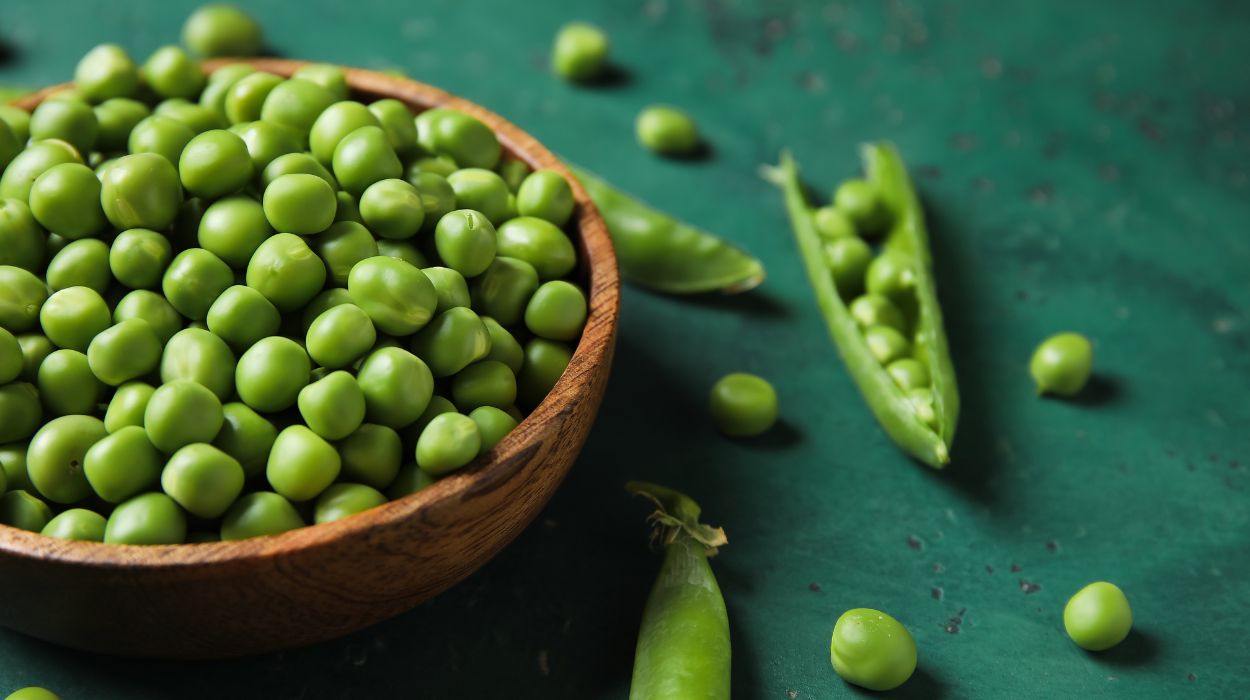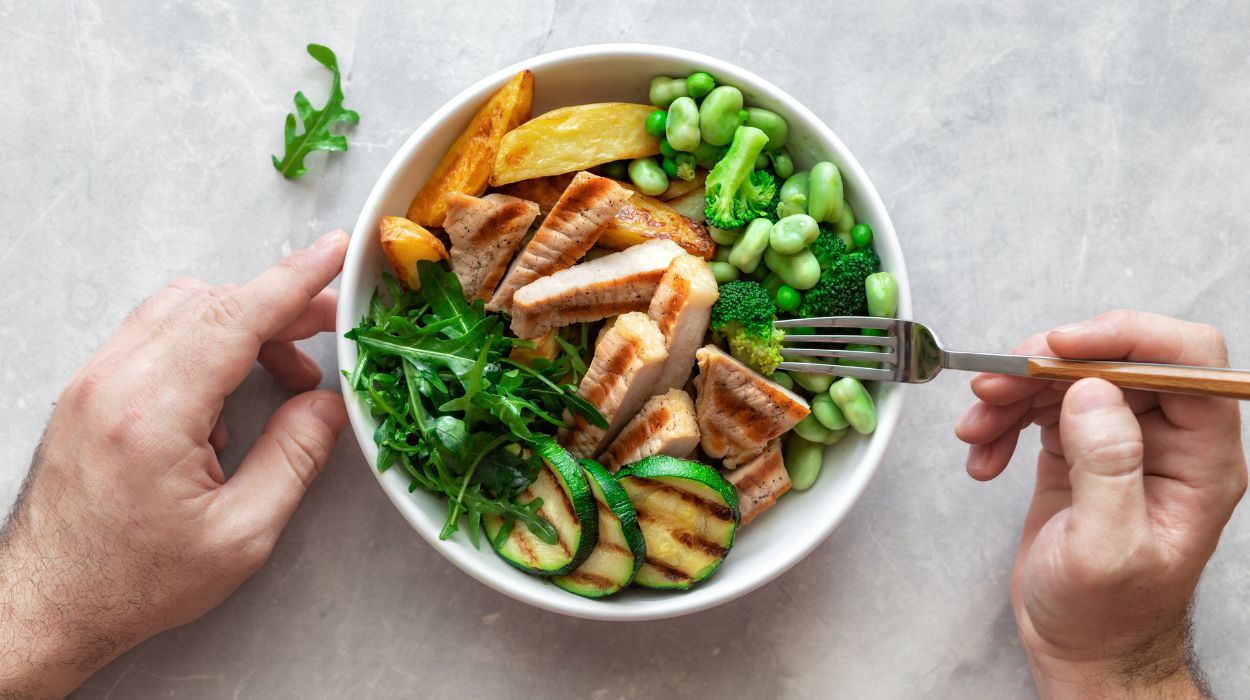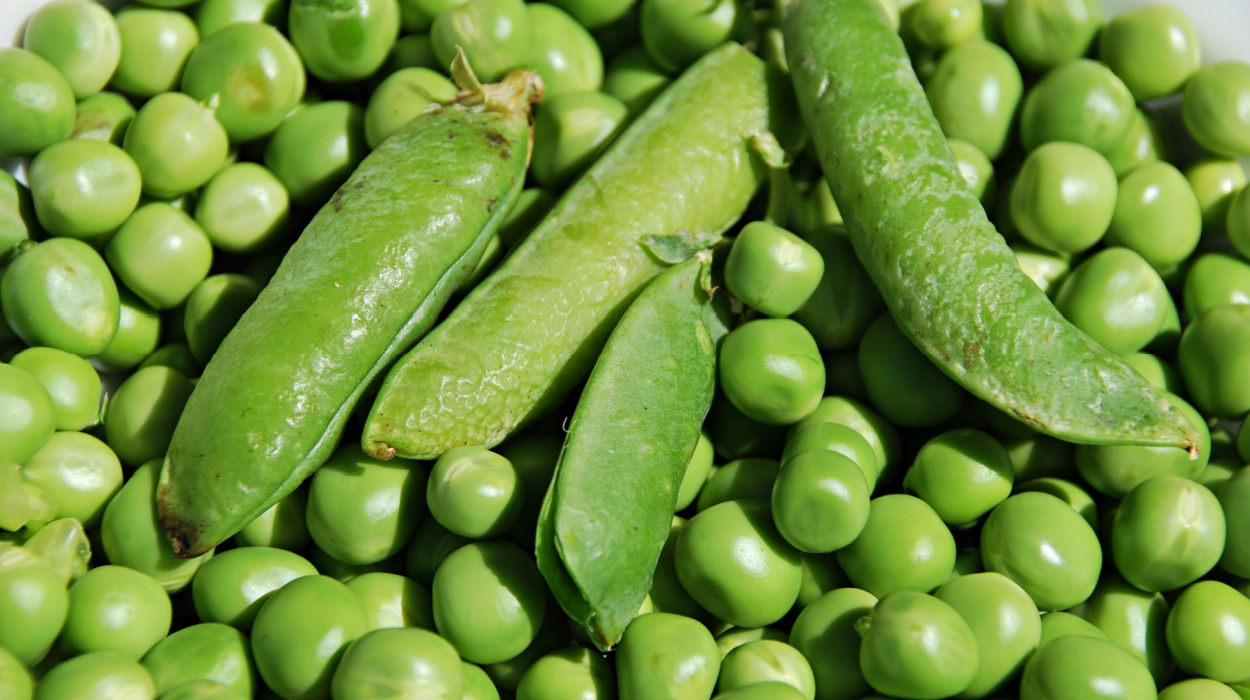Peas are often overlooked in the vegetable aisle but may be the unsung heroes of weight loss diets. Their unique nutritional profile makes them an excellent choice for those seeking to lose weight without sacrificing taste.
But are peas good for weight loss?
Keep reading to compare them with other vegetables and learn about the latest science pinning the humble pea as a bonafide superfood.
Are Peas Fattening Or Weight Loss-Friendly?
Yes, peas are good for weight loss. Reasons why include:
- Highly nutritious.
- Heart healthy.
- Digestive health.
- Anti-inflammatory.
- Anticancer properties.
- Antimicrobial effects.
- Blood sugar control.
Peas are versatile and can be added to various dishes, offering a convenient way to enjoy their health benefits. Fresh, frozen, canned, and supplement forms all contribute to daily nutrition.
Are Peas Good For Weight Loss?

Yes, peas are effective for weight loss due to being low-calorie and high in dietary fiber and protein. Here’s a quick snapshot of the most common pea variety: The green pea.
Nutritional Profile Of Green Peas
- Calories: 134 per cooked cup.
- Fiber: 9 grams per cup.
- Protein: 9 grams per cup.
- Vitamins and Minerals: Rich in vitamins A, C, iron, and magnesium.
Peas offer a unique combination of higher protein and fiber than other vegetables, making them more satiating. While leafy greens like spinach[1] and kale[2] are lower in calories, they lack the protein content of peas.
The Different Types Of Peas
The pea is a legume that comes in a range of delightful varieties.
Green Peas
Also known as garden peas, green peas benefit your fat loss goals while being slightly sweet, low fat, low-calorie, and high in fiber and protein.
Snap Peas
These peas are eaten pod and all,[3] offering a crunchy texture. They are lower in calories than green peas and have a similar nutrient profile: Rich in vitamins and fiber.
Snow Peas
With edible flat pods, snow peas are thinner and have a softer texture than snap peas while still providing valuable fiber and essential vitamins.
Black-Eyed Peas
Boasting a unique flavor, black-eyed peas are rich in protein and fiber[4] while serving the role of heartier legumes like kidney beans. Black-eyed peas are good for weight loss! They are savory and filling, but especially effective in muscle-building and keeping you satiated.
Field Peas
Typically grown for dry seeds, field peas are often used in agriculture and are one of humanity’s oldest domesticated crops. These colorful beads are used in dried form for soups, stews, and as livestock feed.
Incorporating Different Types Of Peas In A Healthy Diet
Each pea type brings a unique texture and flavor to the dish it inhabits.
- Garden peas can be added to salads, soups, and stews.
- Snap peas and snow peas (together called “sugar peas”) make excellent snacks or stir-fry ingredients.
- Field peas and black-eyed peas cook more similarly to regular beans, making them ideal for heartier meals or salad toppings. And while chickpeas aren’t true peas, they are also legumes that boast many of the same nutrients and dietary applications making them good for weight loss goals.
U.S. dietary guidelines recommend 1-3 cups of legumes[5] per week.
Health Benefits Of Peas

Peas offer many health benefits.[5] Here are the seven with the most impact:
Highly Nutritious
Peas are rich in vitamins and minerals, supporting immune function, skin health, energy production, and a healthy brain.
Heart Healthy
The high fiber content[6] in peas not only aids in weight management but also plays a crucial role in heart health. Fiber helps lower cholesterol levels, reducing the risk of heart disease.
Improves Digestive Health And Gut Flora
Peas benefit digestive health[7] due to their high fiber content, and a healthy gut is linked to improved digestion, immune function, and even mood regulation. Additionally, peas contain compounds that may feed a healthy gut microbiome.[8]
Anti-Inflammatory Properties
Peas have anti-inflammatory properties[5] thanks to the variety of nutrients and high amounts of antioxidants they contain. Foods like this can help reduce inflammation, which is linked to many chronic diseases.
Anticancer Properties
The extracts of green peas have shown notable anticancer activity[9] in various studies. Cancers affected include colorectal, liver, breast, throat, and blood cancer.
Anti-Microbial Properties
Peas and their by-products, including pea peptides, lectins, polyphenols, and polysaccharides, have shown significant antimicrobial activities[5] against various bacteria and fungi. These properties highlight the potential of peas and their components to serve as effective antimicrobial agents in the food industry.
Improves Blood Sugar Levels
Recent research[10] suggests that a natural compound from green peas benefits individuals fighting diabetes by lowering blood sugar and HbA1c levels (a long-term blood sugar indicator).
How To Use Peas For Weight Loss
One of the great advantages of peas is their versatility.[11] They can be easily incorporated into various dishes, from soups and stews to salads, pasta, and stir-fries, making them one of the best veggies for weight loss. Eating raw peas is ideal, but other options such as frozen, canned, and fruit and vegetable supplements can also contribute to your daily nutritional intake.
Here’s a structured guide with numbered steps to help you effectively incorporate peas into your diet for weight loss:
Understand Portion Sizes
Start by getting your portions right. Maintaining a calorie deficit is crucial for weight loss, and understanding the right portion sizes of peas can help achieve this goal. A standard serving of peas is about half a cup to one cup.
Plan Your Meals
There’s room for peas in all types of dishes, and it helps to plan to keep your meals balanced and tasty. Repeating the same meals or using the same ingredients over several meals reduces food waste, makes shopping trips shorter, and keeps counting calories simpler.
Experiment With Healthy Recipes
Use peas in various recipes to keep your diet interesting and healthy while losing weight. Here are some simple ideas you can experiment with.
- Enhance your salads with canned black-eyed peas or green peas to boost protein intake. Consider apple cider vinegar or lemon juice as a dressing, as they have fewer calories and provide an extra burst of vitamin C and other essential nutrients.
- Stir-fry snow peas or snap peas with another lean protein source, such as tofu. Serve over brown rice or turn it into a pasta dish for a complete meal.
- Incorporate low-calorie pea protein powder into various foods or try some of the recommended whey protein for added benefits.
- Snack on raw green peas for a guilt-free sweet treat!
Conclusion
The humble pea is one of the best veggies for weight loss. From its low-calorie yet nutrient-rich profile to diverse varieties and numerous health benefits, peas offer a unique combination of qualities that can aid in weight loss.
While you cannot live on peas alone, their versatility and sweet flavors make peas a smart choice for anyone looking to decrease calorie intake. Embrace the potential of peas and let them play a pivotal role in your journey towards a healthier lifestyle.
Frequently Asked Questions
Peas are healthy and rich in fiber and protein while low in calories, making them more beneficial for health and weight management than fattening.
Absolutely, peas are excellent for a low-calorie diet due to their low-calorie content and high nutrient density. They are ideal for low-calorie diets.
Yes, frozen peas retain most of their nutritional value. For individuals on a salt-restricted diet, frozen peas are superior to canned peas, which contain high sodium levels.
Black-eyed peas are excellent for weight loss. They are a good source of protein and fiber, which help in feeling full longer and can contribute to a weight loss diet.
 Evidence Based
Evidence Based
